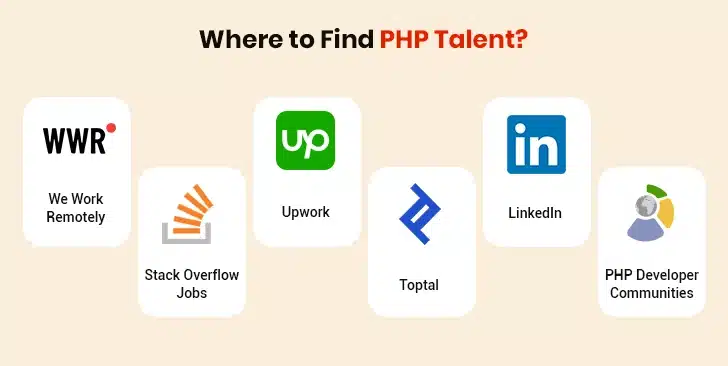High-performing websites and applications require qualified developers. PHP remains the backbone of modern web development. It powers everything from dynamic websites to complex enterprise systems. This explains why PHP developers are in high demand. However, local hiring often means high salaries and limited options.
Offshore teams close this gap. They offer access to a global talent pool trained in the latest frameworks and tools. These developers bring specialized skills to the table. This makes sure projects stay innovative and efficient. Today, offshore PHP developers aren’t just a cost-saving move—they’re a strategic advantage.
This guide talks about everything you need for hiring PHP developers. It explains practical strategies businesses should follow to build successful offshore partnerships in 2025.
Table of Contents
Why are Businesses Hiring Offshore PHP Talent?
Preparing to Hire Offshore PHP Developers
Steps to Hire Offshore PHP Developers
- 1. Where to Find PHP Programmers
- 2. Evaluate Technical Skills
- 3. Check References and Past Projects
- 4. Legal Considerations
Managing Offshore PHP Teams Effectively
Common Pitfalls to Avoid When Hiring Offshore PHP Developers
Why are Businesses Hiring Offshore PHP Talent?
The PHP programming language powers about 80% of websites worldwide. It is integral to modern web development. Here are a few reasons why businesses are looking at offshore talent pools to get their development work done.
1. Cost-Effective Talent Acquisition
One of the key advantages of hiring remote PHP developers is cost-effective web development. Offshore destinations often have lower labor costs compared to hiring developers locally, which in turn, allows enterprises to secure top-tier talent without exceeding their budgetary constraints, leading to significant cost savings in the talent acquisition process.
For instance, developing nations like the Philippines, India, and Ukraine have a vast pool of talented and skilled PHP developers who bring a wealth of experience in web development at lower rates than their counterparts in North America, Canada, Eastern Europe, or Australia. This lower labor cost translates into significant cost savings for small and mid-sized businesses with limited budgets. Let’s take a look at an illustration showing the average salaries of PHP developers in different regions.
| Country | Average Annual Salary |
| United States of America | $1,02,954 |
| Canada | $1,07,000 |
| Australia | $71,000 |
| Denmark | $70,000 |
| Norway | $68,000 |
| Germany | $56,500 |
| Poland | $18,500 |
| India | $6,000 |
| Ukraine | $2,700 |
Hiring PHP Developers Right the First Time
2. Reduced Overhead Costs
Hiring dedicated PHP programmers from an offshore region allows enterprises to significantly cut down on overhead costs associated with the purchase and maintenance of hardware and software licenses, maintaining physical offices, on-site amenities, office supplies, and other utilities, coupled with employee-related expenses such as paid leaves, taxes, and insurance. In other words, hiring a remote team of PHP developers saves enterprises from bearing the costs associated with office space, IT system maintenance, utilities, and additional infrastructure required to provide a conducive environment for web development.
It is estimated that offshore development can help enterprises save up to 50-70% by cutting down on operating expenses and salaries. This sharp reduction in overhead costs with offshore PHP web development translates into substantial cost savings that can be utilized towards core business activities or invested in strategic initiatives. The paradigm shift from in-house to offshore PHP web development not only eliminates overhead costs but also aligns with the modern trend of decentralized and flexible work environments.
3. Currency Exchange Advantage
Enterprises planning for offshore PHP web development can leverage currency exchange rates to their business advantage. It’s strongly recommended to hire PHP experts from countries where the local currency has a favorable exchange rate against the enterprise’s native currency to amplify cost savings.
For instance, a company based out of the United States can prefer hiring PHP developers from developing nations like India since the currency of the U.S. is much stronger than the currency of India (1 USD is equivalent to 83.24 Indian Rupees). As a result, the cost of development services, salaries, and other expenses becomes more economical. This currency exchange advantage not only improves the cost-effectiveness of remote PHP web development but also contributes to maximizing overall savings for an enterprise.
4. Scalability and Flexibility
Offshore PHP web development provides enterprises with a significant advantage in terms of flexibility and scalability in resource management. Companies that prefer in-house development may face resource constraints when project requirements fluctuate. On the other hand, remote web development allows enterprises to bridge the talent gap and scale their development efforts quickly to meet new project demands.
This level of flexibility and scalability ensures that businesses are not burdened with the fixed costs associated with maintaining a large pool of in-house PHP web development experts during periods of lower project activity. In other words, the flexibility and scalability that come with remote PHP web development allow enterprises to quickly adapt to changing project demands, timelines, and business priorities without bearing the financial burden of maintaining an in-house development team. This adaptability is the key enabler for maximizing cost savings as it allows businesses to optimize resource allocation as per the changing project requirements.
Latest PHP Trends for Mastering the Web Development Landscape
Preparing to Hire Offshore PHP Developers
Bjarne Stroustrup, creator of C++, puts it well: “The most important single aspect of software development is to be clear about what you are trying to build.”
Companies that spend time planning before hiring report higher satisfaction rates with their offshore teams. This preparation sets the stage for successful offshore PHP development partnerships, even before posting job listings or reaching out to agencies.
I. Define Clear Project Requirements
Successful hiring starts with exact project specifications. A clear project brief helps developers assess if they can fulfil your needs. It also prevents things from becoming cost-prohibitive later.
A requirements document should include:
- Core features vs optional elements
- Technical stack specifications (Laravel, Symfony, WordPress)
- Integration requirements with existing systems
- Project timeline and major milestones
- Quality benchmarks and performance measures
II. Select the Appropriate Engagement Model
Freelancers, dedicated teams, or project-based outsourcing? The choice will affect both cost and project outcomes. Each model serves different needs.
For smaller projects that need specialized skills, freelancers are an ideal option, though they need more oversight. Larger, ongoing projects benefit from dedicated teams that work as your extended development arm. For one-off initiatives or product launches, project-based outsourcing fits well.
III. Establish a Realistic Budget
Money matters when you hire full-stack PHP developers. Developer rates from Eastern Europe can be up to 50% lower than their Western counterparts. All the same, it is essential to factor in expenses beyond hourly rates. These include aspects such as communication tools, project management software, and quality assurance processes.
IV. Evaluate Technical Requirements
Finding developers with relevant experience starts by assessing what technical expertise your project needs. See if your project requires core PHP skills or framework knowledge like Laravel or Symfony. In addition, skills related to database management, API development, or third-party service integration may also be needed.
V. Consider Cultural Compatibility
Cultural differences can lead to misunderstandings that impact project timelines. Does your potential team understand your work culture? Are they familiar with your deadlines, communication norms, and working styles? Answering these questions helps avoid cultural incompatibility down the road.
VI. Plan Communication Structures
Effective communication makes offshore development work. Establish clear communication protocols before hiring, including:
- Preferred communication channels (Slack, email, video calls)
- Meeting schedules that accommodate time zone differences
- Reporting expectations and documentation standards
- Core working hours when teams must be available
VII. Prepare Legal Frameworks
Legal considerations should be addressed before bringing offshore PHP developers on board. This means getting NDAs ready, protecting intellectual property, and creating clear contracts about deliverables, timelines, and payments.
Adequate preparation helps create a strong foundation for successful collaboration. It reduces risks. It also helps you get the most from your investment.
Steps to Hire Offshore PHP Developers
A well-thought-out approach is needed to source, screen, and secure the right talent. It is possible to identify skilled offshore PHP programmers by using the right platforms and assessment methods.
1. Where to Find PHP Programmers
The hunt for offshore PHP developers starts with the right recruitment channels. Specialized platforms like We Work Remotely or Stack Overflow Jobs are great for finding PHP talent located anywhere in the world. Freelance platforms like Upwork and Toptal help connect with contract-based developers, though these might not work for long-term positions.
For those looking for senior PHP developers, direct outreach through LinkedIn and social media often works best. These experienced professionals typically avoid job boards but respond well to personal messages. In addition, partnering with dedicated development companies also makes hiring easier. These companies provide access to pre-vetted PHP developers. As a result, there is no need to spend time on screening and interviews.
Key platforms to consider:
- Job Boards: Djinni, We Work Remotely, Stack Overflow Jobs
- Freelance Platforms: Upwork, Toptal
- Direct Outreach: LinkedIn, PHP developer communities
- Offshore Development Agencies: Provide pre-vetted talent pools
2. Evaluate Technical Skills
How do you know if a developer really knows PHP? This question is one of the trickiest to answer. Technical assessment platforms like TestGorilla or SkillValue help verify practical knowledge before a commitment is made. These tools offer over 500 tests covering more than 160 technical skills. These include back-end, front-end, and full-stack capabilities.
Effective technical evaluations assess a developer’s proficiency with PHP frameworks (Laravel, Symfony), database management, and API development. Knowledge of core PHP and relevant frameworks should be tested first. This should be followed by an assessment of database skills and integration abilities. Many companies run technical interviews for at least 6-8 hours to find top talent. If this sounds excessive, the cost of a bad hire is typically much higher.
3. Check References and Past Projects
The cost of a bad hire extends beyond dollars and cents. Hiring the wrong person often affects a company’s productivity, culture, and reputation. Detailed background checks help avoid these mistakes.
Contact a candidate’s previous employers to verify their experience, involvement in a project, and working style. Also, request code samples to understand their coding ability and collaboration standards.
Reference checks for offshore PHP developers should go beyond basic questions. It’s worth asking how they measured the success of a PHP project, or what they’d do differently in future projects.
4. Legal Considerations
Protecting business interests requires strong contractual safeguards. In the absence of clearly defined contracts, projects invite scope creep. This leads to delays or overruns. It is, therefore, important to draft a detailed agreement that covers deliverables, timelines, and penalties for non-compliance.
Intellectual property protection is a critical priority. An ambiguous definition of ownership often leads to IP disputes. Make it clear that all intellectual property developed during the project (e.g., code, designs, and innovations) belongs exclusively to your company. Also, ensure all IP rights are transferred right after the final payment.
Data security is another vital concern. Adding confidentiality agreements with IP clauses protects sensitive business information. Companies working with offshore developers should follow international data protection standards like GDPR to avoid penalties.
Managing Offshore PHP Teams Effectively
Successful offshore PHP collaborations depend on good management practices. Development teams need strong systems for communication, project management, and quality control to deliver desired outcomes.
Communication Strategies
Clear communication eliminates confusion and speeds up development. Daily 15-minute stand-ups through Zoom or Skype keep everyone aligned despite gaps in time zones. Plus, messaging tools like Slack support ongoing dialog and quick resolution of issues.
Documentation isn’t optional—it’s the backbone of a successful IT project. Teams using structured documentation see fewer errors in project execution. It is, therefore, essential to create detailed functional requirements, technical specifications, and user stories to remove ambiguity and guide development. In addition, ask your PHP team to document the progress happening during development. This builds a knowledge-sharing culture where everyone learns continuously.
Project Management
Agile methodologies work well with distributed development teams. Companies that use Agile report 28% higher project success rates than those using traditional methods. In addition, Scrum and Kanban help complete a project in small increments. These reduce inefficiencies and let teams adapt to changes in project requirements.
The choice of project management tools matters:
- Jira helps prioritize tasks and spot bottlenecks
- Trello’s card-based interface works great for visual thinkers
- Asana offers customized dashboards and thorough task tracking
It’s essential that your team always communicates through the chosen communication platform, not through scattered emails or chats.
Quality Assurance
Strong quality assurance protects your investments. Code reviews reduce post-release bugs by up to 80%. Also, every hour spent reviewing code can save hundreds of hours in maintenance down the road. It is, therefore, important to establish coding standards and review code regularly to catch problems in a timely manner.
Testing tools like Selenium, TestComplete, and JUnit help find bugs before they reach production. In addition, clear milestones help measure progress and keep the team accountable throughout development.
Managing offshore PHP teams requires a methodical approach. Build purpose-built communication structures, choose appropriate project management approaches, and enforce systematic code reviews. These practices turn skilled developers into great teams that deliver consistent results.
Common Pitfalls to Avoid When Hiring Offshore PHP Developers
Even seasoned companies hit roadblocks when building offshore PHP teams. Anticipating these common pitfalls helps you avoid costly delays, wasted resources, and frustration.
I. Overlooking Time Zone Overlaps
Time zone differences create huge collaboration challenges that companies frequently underestimate. Research shows that a mere one-hour gap reduces synchronous or real-time communication (e.g., phone calls, video conferencing, and instant messaging) by around 11%. Synchronous communication allows teams to exchange lots of information quickly. It also enables immediate feedback. Inability to communicate in real-time affects project progress.
Many companies use a “follow the sun” model where work gets transferred between teams in different time zones as the day progresses. This allows round-the-clock operations. Others set up core hours when all teams must be available. Regular time audits with tools like Toggl Track help spot when team members stretch beyond reasonable hours.
II. Skipping Due Diligence on Developers and Agencies
Companies often rush their hiring decisions based just on the price tag. This rarely works out well since the cheapest option seldom gives the best results.
Before picking your offshore PHP team, it is vital to:
- Check their technical skills and knowledge of relevant frameworks
- Evaluate their past projects similar to yours
- Talk to their past clients to get feedback on reliability and quality
- Make sure they fit with your company’s culture
It is essential to pay attention to whether developers adopt modern PHP frameworks and development practices. Outdated coding practices produce substandard output that drives long-term costs for fixes and technical debt.
III. Poor Onboarding and Feedback Processes
Even the most experienced developers may fail to deliver without proper integration. Inability to adjust to the client’s time zones or follow their development practices may lead to a decline in code quality.
Proper onboarding helps offshore developers grasp your project requirements, company culture, and communication standards. Teams thrive when they acknowledge cultural differences and varied working styles. Regular check-ins with clear feedback channels help catch issues early.
Many teams rotate meeting times to share the inconvenience evenly across time zones. Recording key meetings and creating written summaries helps everyone on the team stay updated with the project progress.
The Final Word
Businesses that hire PHP experts enjoy a clear advantage: quality code at lower costs. These companies save around 50-70% on development while tapping into a global talent pool with specialized skills.
The path to successful offshore partnerships starts with the right preparation. Clear project requirements, choosing the right engagement model, and setting realistic budgets create the foundation for effective collaboration. In addition, choosing a trusted technology company like Damco dramatically boosts your chances of success.
Offshore PHP development is evolving with technology. Companies that use this strategy with a meticulous approach gain benefits in the form of cost savings, specialized expertise, and flexible development capacity. As tech requirements become complex, offshore PHP developers offer a sustainable solution for businesses looking to balance quality, cost, and specialized talent access.








